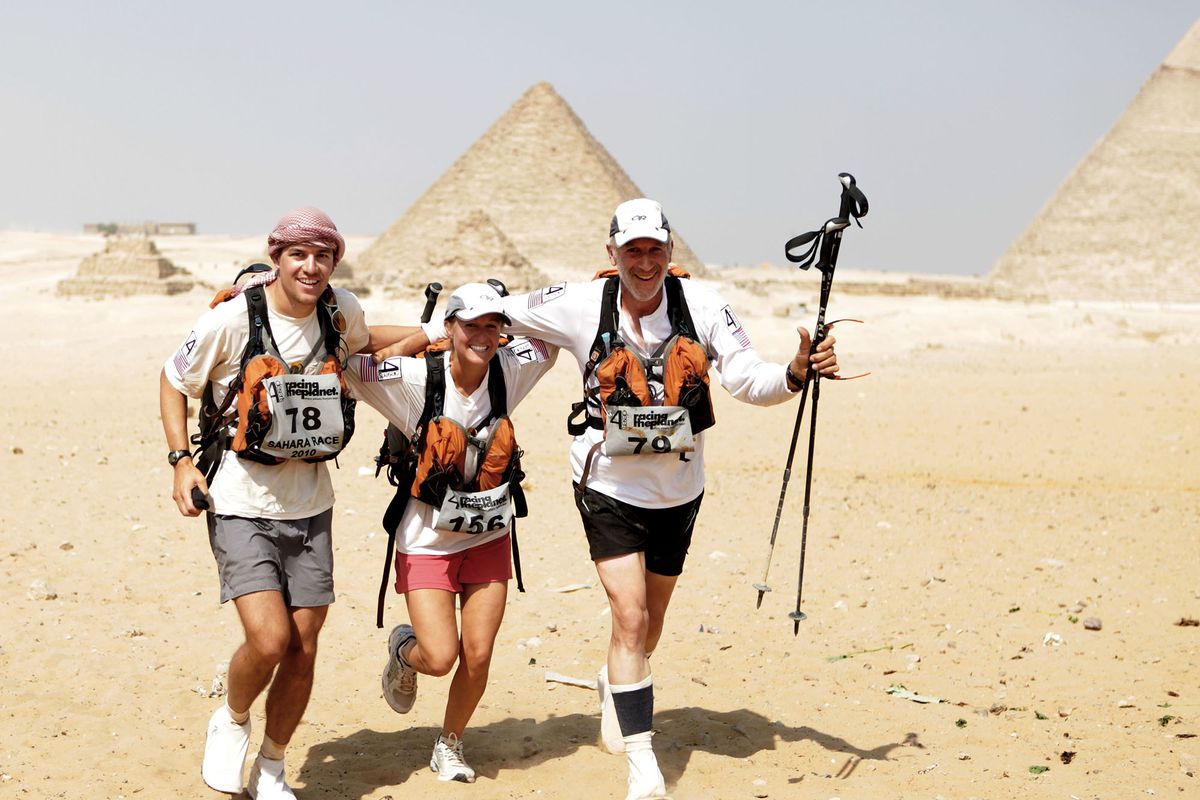Family endures ultra adventure in Sahara

T he Sahara Desert was a high point for the Lowe family, led by a father with a weakness for challenging his endurance.
In the past year, Ted Lowe of Colbert exposed himself to minus 30 temperatures on a multiday ski trek, pulling a sled with gear up Athabasca Pass in the Canadian Rockies to celebrate the centennial of David Thompson’s crossing.
You can’t blame him for needing to cool off just a couple of months after completing a race in Egypt where the temperature soared to 120 degrees.
The Sahara Desert adventure, organized by Racing the Planet, involved a 28- to 30-mile marathon each day for four days over Sahara sand dunes capped by a 58-mile ultramarathon.
Participants have to carry their sleeping bag, clothes, space blanket, blister kit other gear and food for five days on their backs, plus the water they need between the five daily checkpoints.
That’s too much fun to enjoy alone, so Lowe made it a family affair with his two 20-something kids, who were fit for the challenge.
• Matt, 21, a systems engineer, is a former Mead High School track and cross country star.
• Carrie (Lowe) Zederkof, 27, had plunged into trail running on and above the California beaches where she works for the Air Force.
Matt made the pitch for the desert vacation, noting, “As strange as it sounds it just seems simple, almost clean. There is no mud, no scrub, no humidity; just the sun, rocks, sand and as much terrain as you are willing to hike or run.”
And Carrie held them to the training when the men had second thoughts.
“A lot of the fun was the year of preparation,” said Lowe, 65, who works in the Spokane research center for the National Institute for Occupational Safety.
“We became partners in pain, and Carrie was the pusher.”
Not that he needed it. Lowe’s a master at creatively preparing for outdoor adventure ordeals while staying employed.
In 2005, he carved out plenty of paddling time in preparation for the Yukon River Quest – the world’s longest annual canoe and kayak race, running 460 miles from Whitehorse to Dawson City.
But he also focused on a major yard landscaping project to build upper-body strength.
The family wedding that summer was in a beautiful setting – and Lowe had no trouble paddling nonstop for three days straight.
Gearing up for the Sahara, he hiked up to 80 miles a week, often logging a couple of miles before work, a fast 4 miles at lunch, another fast mile during an afternoon break and winding down with 7 miles after work.
“I’m not a runner anymore,” he said. “But I walk as fast as many people run. I use hiking poles, taking about 10 percent of the load off my legs when I’m using them correctly.”
Their exhaustive research into the lightest packs led them to the New Zealand-made Aarn Marathon Magic 33 with front balance pockets.
“Nothing from the USA compared with it,” Lowe said. “My pack for five days was heavy at 22 pounds. Matt’s was 19.”
They took race veterans’ advice and bought shoes two sizes larger than normal to accommodate swollen feet.
In the end they were winnowing ounces with the precision of a diamond cutter.
“Only so much sunscreen and in the smallest tubes; the smallest possible compass and safety pins for our numbers, expedition freeze-dried meals with the highest calories …”
By the time they bused deep into the desert and started the first desolate leg, they’d experimented with nutrition – gels, nuts, soup, how much and how often, and what might stay down and sustain them through hours of exertion.
They bolstered their electrolytes with Succeed and drank like the camels that would follow the racers each day toting helpers to pick up straggler and the course markers.
Still, they had much to learn about sandstorms, enduring heat – the coolest day reached only 105 degrees.
“Sand got into everything,” Lowe said: “The gritty kind and the powdery kind where desert seeps would evaporate leaving a fine powder that even went through my gaiters to pack tight in my shoes between my toes.”
Out of 160 starters from more than a dozen nations, the attrition started quickly.
“A fellow my age in my tent the first night listed a bunch of marathons he had run,” said Lowe. “He was sure he would win his age group, which took me down a notch. That was my ambition.
“But after the first day, he was done. He wasn’t urinating. They wouldn’t let him continue.
“Everybody entering this event prepares, yet the dropout rate is around 20 percent.”
Veteran 4Deserts racers figured that into their strategy. After the mandatory equipment check, they’d jettison some of their food to lighten their loads and depend on scavenging from the dropouts along the way.
Although race organizers provided water for drinking and cooking at night, it was rationed. None was available for bathing.
“We took no extra clothes because we didn’t want to carry extra weight,” Lowe said.
“You need the sleeping bag, though. Dark desert nights can be chilly.”
Evenings focused on rehydration and blister care left no time for partying.
They’d soak swollen feet in saline solution each night. Lowe lost two toenails and 9 pounds off his already lean frame.
Matthew, 21, won his very competitive age group. Lowe easily won his, and Carrie also placed high even though she fell sick a few times but kept going.
“I caught her and passed her once,” Lowe said. “It’s hard to pass your daughter in the middle of nowhere and not help her, but competition is competition.”